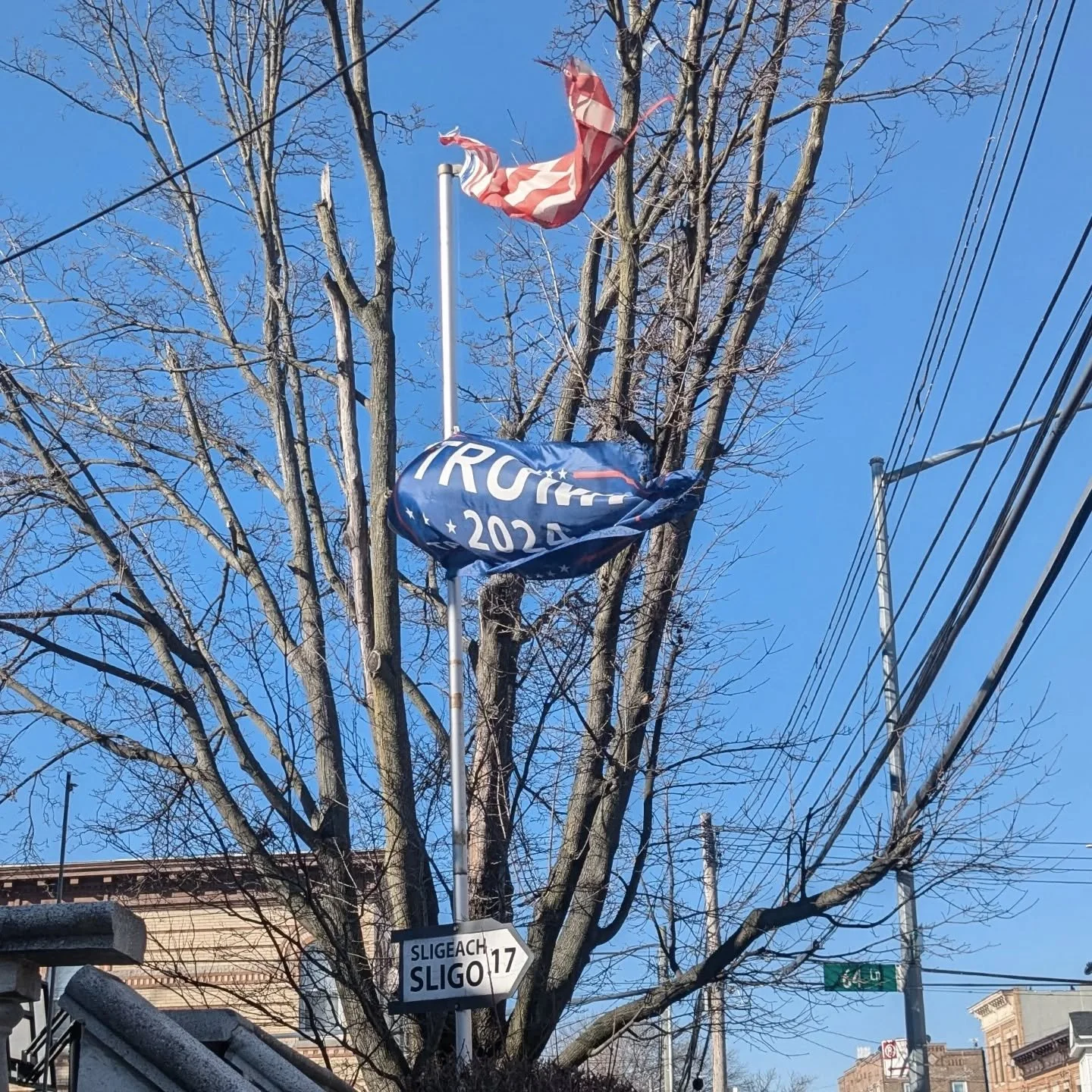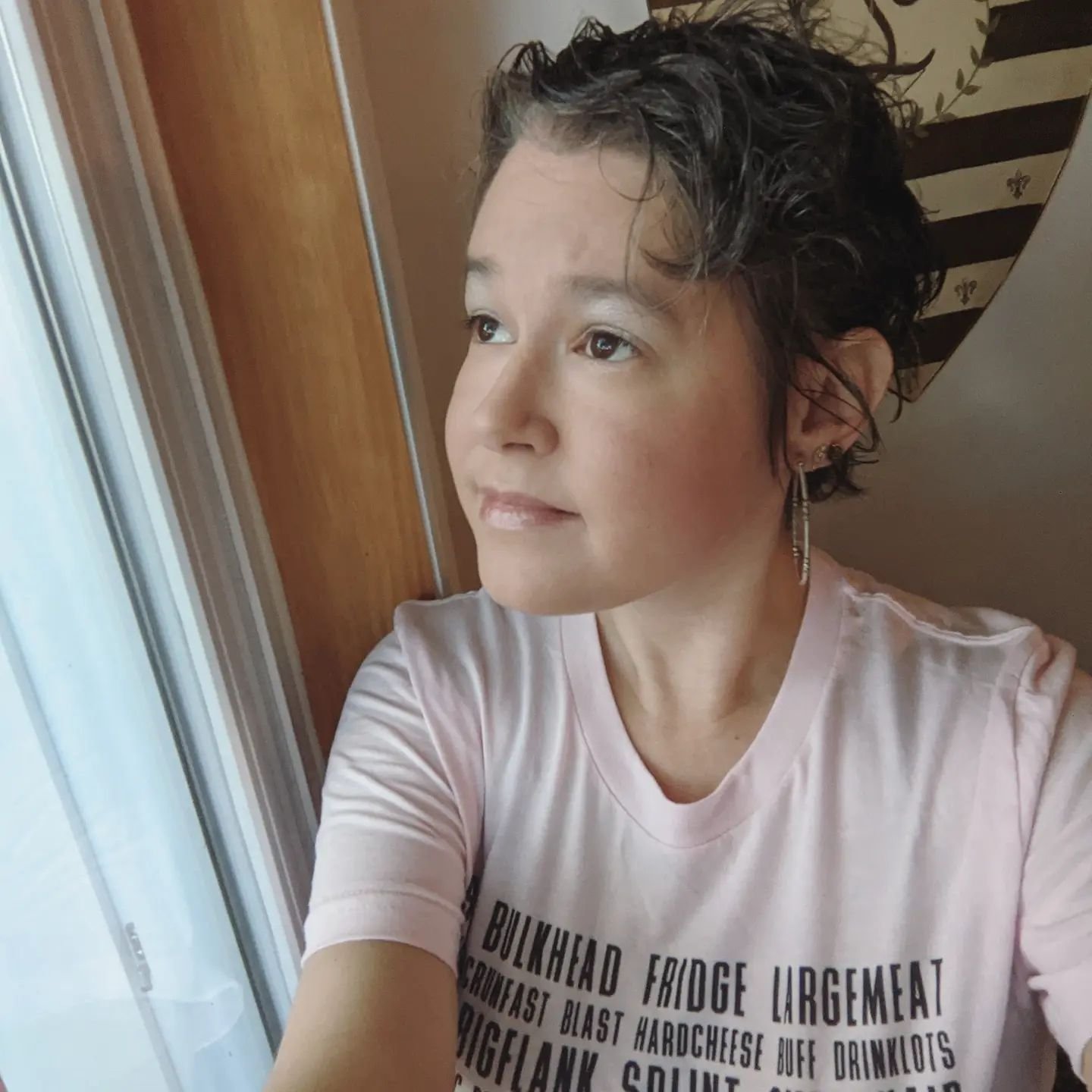Historical Take: Paying Serious Attention to This Flag/Sign Combo
/…and why it’s a Big Problem.
So I was out for my daily constitutional in Queens, and I live adjacent to a very old-school Irish neighborhood where the graveyards are vast, the subway lines distant, the Christmas lights jaw-dropping, the garden gnomes prolific, and the votes as red as the gnomes’ hats. They have separate houses with separate paint colors, and postage stamp yards that require nevertheless Actual Lawn Mowers, and the Guinness signs hang proudly outside the aesthetically shabby watering holes. People are super friendly, you can get great cold cuts, you can’t swing a dead cat without hitting a Catholic Church, and everyone seems to be out walking their adorable dogs almost all of the time.
I’m super great with most of that, naturally—and to boot, I’m a hefty chunk Irish (see: complexion).
Now, as I passed this particular flag/sign combo, during BLACK HISTORY MONTH (I prefer to do it in all caps because it still exists, you dickless Google motherboys), as the author of The Gods of Gotham, giant blaring alarums rang in my ears—my pate was rattled, so to speak, and while this won’t be a surprise to anyone who’s read the Wilde trilogy, this motherf***ing South African post-apartheid coup has me pissed enough to give a quick overview on just ONE aspect of How We Got In This Mess.
By talking about the Irish and their history, during BLACK HISTORY MONTH.
In the year 1845, the Irish started landing en masse at Ellis Island—in such incredible droves that NYC was overwhelmed, bewildered, and then panicked. These Irish had escaped horrific racially-motivated economic slavery (sounds familiar, si?), and they were about at the point where a toothpick looked like a Sizzler buffet, and when they walked off the boats, they discovered that the largely protestant Eastern seaboard absolutely detested Irish Catholics.
Whoops.
But Protestants had a great reason to hate the new immigrants, see: they were quite literally the signal of the Second Coming. Why? Sounds serious. Well, because they worshipped the actual genuine Antichrist, AKA Pope Gregory XVI, which was reason enough to kick the Micks around and slap NO IRISH NEED APPLY signs all over the windows, and if your pal and mine Greg Sixteen ever apologized for having been a really disappointing Antichrist, seeing as Jesus promised to bring a twelve-pack of Miller High Life and then didn’t show up to the rager, then I’ve never heard about it. Greg should, though. Belatedly. Jesus too!
So the Irish—still being starving and whatnot—started seeking out the shittiest jobs they could find. Like, “Help Wanted: Subhuman To Scrape the Shit Off of My Shit” level of shitty jobs. The problem was an unlikely one: THOSE jobs were already occupied, and in very high demand. By whom, you might wonder (but then again you might not).
The “free blacks” already had/wanted to have those spiffy shit-scraper occupations. Mainly because black people—like Irish people, like many ethnic groups—enjoy having food, so they can cook the food, and thereafter eat the food. There’s a reason it’s the poor people who come up with the most delicious foods, because screw duck a la presse.
Now, if you don’t already know that politics is economics and economics is politics, about as inextricably as a set of conjoined twins (but freakish and abhorrent, unlike regular conjoined twins, who are pretty cool), then cough I don’t really know what you’re doing here, but they are. Tammany Hall was just starting to really flex its muscles during the 1840s, and they were the pistons of the Democratic political engine—the party of the rag-tags, the poor, the smelly, the uncouth who could beat you in the physical fight it would take you to shove one of your six or eight votes around town under various monikers into the actual ballot box. The Whigs, on the other hand, were the party of the rich, the indoorsy, the laudanum-marinated choicest meat cuts, the Chinoiserie, the tasseled lampshades.
It occurred to Tammany that—while they might not LIKE the Irish—the adult Irishmen could VOTE.
But free black men didn’t get the right to vote till the 15th Amendment was ratified February 3rd, 1870. No, not in 1868, that was the 14th Amendment, that one declared them People and not Candle Holders—we had to really drive it home two years later with another one saying they could vote, too!
My gist being that in 1845, there was absolutely no point to kissing up to poor free blacks politically/economically: where was the profit in that? Whereas the frillions of sudden male Irish immigrants were DEFINITELY taking it from Satan up their chocolate Cheerios, they could still make their mark at the polling booths, and that was valuable enough to ignore what they chose to do with their dirty starfish in their down time with Greg, having a wank thinking about the Vatican.
The way you got people to vote for you in 1845 was the same way you get people to vote for you in 2025, 180 years later: promise them food, and promise them jobs. So they can get “GRO-cer-reez,” as the Orange Puppet calls them, having never been in a checkout line in his life. Now, how to get the Irish plenty of taters and cabbage and the occasional “cheat day” slice of bacon?
Easy: pit them against the free blacks for the shitty jobs.
This is a problem for us RIGHT THIS VERY MINUTE, because there’s a reason the Orange Puppet won in a free election last year, and there’s a reason he makes friendship bracelets for a guy whose fanciest vehicle literally gets broken into by raccoons because they mistake it for a dumpster—and why Trump himself (hyperlink is to New Lines Magazine) has taken to whining about “a certain class of people” (read: Rich White Douch Canoes) being treated very badly in South Africa (why there, of all places, when he knows so little about foreign politics and that isn’t even happening???).
Equality, to a set of people who’ve made it but were formerly disenfranchised, can sound like dirty pool. Protestants don’t bitch about it anymore, but let’s not forget why Plymouth Rock happened in the first place. The vitriolic anti-Papist ravings in the 1840s and 1850s were shocking, but the Irish adapted, and don’t worry! The Chinese will arrive soon and they’ll be next! And always…I cannot emphasize this enough…always, when we run out of new groups to grind down, there’s still African Americans.
Why did Kamala Harris lose, ultimately, when she had the qualification of being the only sane non-convicted felon running? For lots of reasons, yes, but this one slapped me straight in the face yesterday, in my own neighborhood.
Kamala Harris is black.
Oh, your immediate urge is to tell me DUH, or maybe throw all the OTHER reasons she lost in my direction?
That’s fine, blow up my comments threads, but I’m talking about THIS reason right now.
That Trump’s rhetoric is racist is indisputable, particularly given his version of a dog whistle (read: air horn) to the KKK cosplayers being “some very fine people on both sides.” But what I want folks to understand is one of the reasons why generally kindly Americans still fall for it. I don’t imagine that the family living down the road from me set out to fly a racist combination of flags—unless they truly, genuinely detest Mexicans, in which case I think their family, GENERATIONALLY, should be disallowed from ever having tacos again as punishment. What I imagine they meant to do was express their patriotism, support their political team, and call out their homeland, all while hoping that a pathological liar who can’t pronounce GRO-cer-eez was going to help out with the price of eggs.
Or at least—I’d like to imagine that’s what they were going for, since the entire concept of the Irish being ANTI-immigrant is fucking hilarity in a time capsule.
And there SHOULDN’T be anything remotely wrong with Hibernian pride, or with political pride, except for the fact that Northern white American Democrats make a ton of noise about Southern white Americans and racism and Confederate bullshit (guys—you guys lost, guys—the Confederates, not the South, y’all are great, but Confederate dress-up guys, GUYS), while TOTALLY FORGETTING to call out this combination of specifically meaningful Northern flags when flown in combination. NYC DOES NOT SHARE A BORDER WITH MEXICO, GEOGRAPHERS AMONGST YOU.
But we do boast a ton of Irish heritage.
These flags tell me these people were taught to be proudly based in Sligo originally, which is effing fabulous, and they love America, and they voted for the Deadly Overripe Mango who’s turning it over to a South African apartheid-loving lunatic who COULD use his billions to fix what’s broken and instead is smashing useful things like a sociopathic ten-year-old catching critters to torture.
Maybe this connection is too obvious for me to have written an entire post about—if so, then by all means walk away. But I haven’t done anything meaningful for BLACK HISTORY MONTH yet, and I’ve got about one more day, dammit, and if honoring African Americans means going on a tear about the culturally inherited anti-POC sentiments that a mere percentage but significant enough to note of Irish people walk around with, potentially not even knowing it?
Then it was a morning I consider well-spent.




















